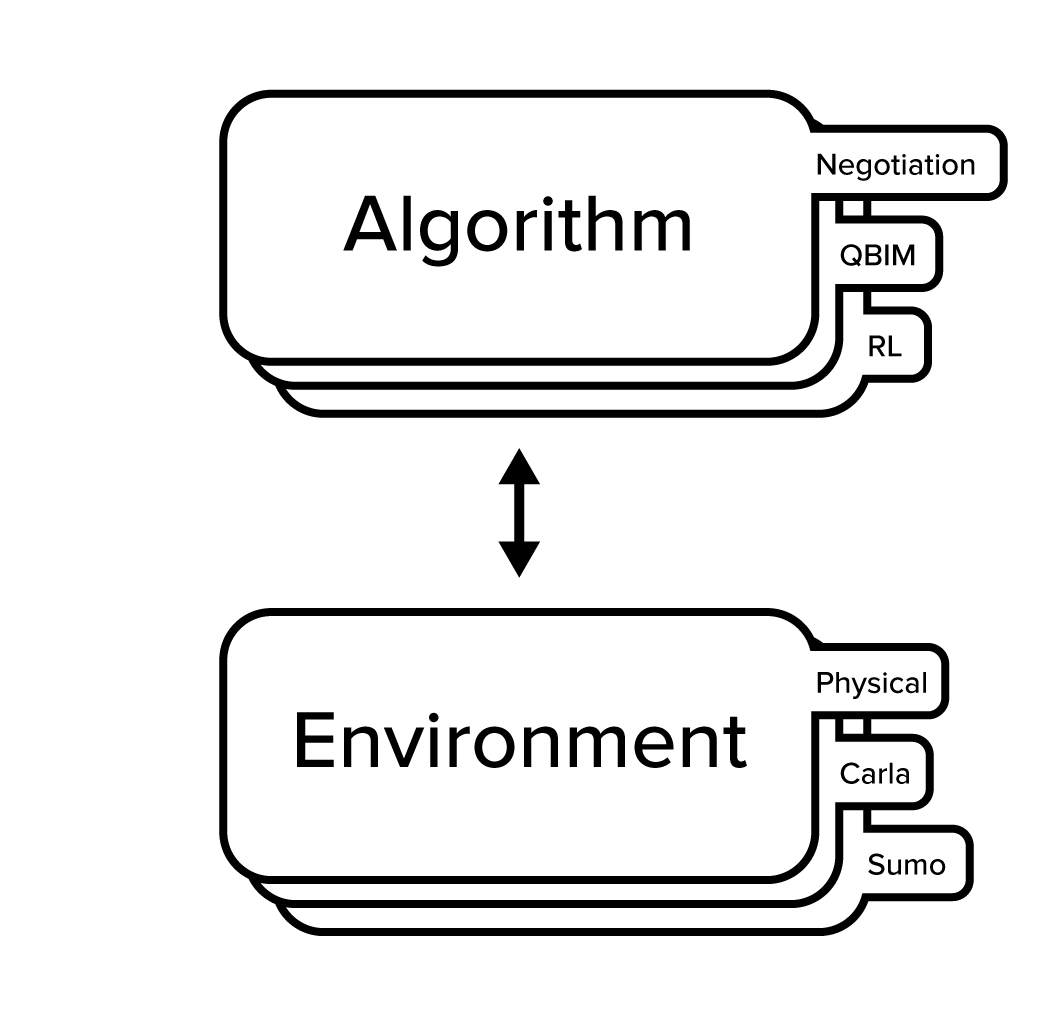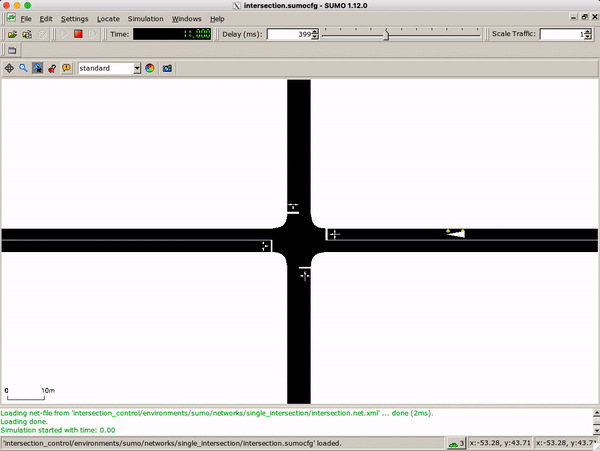IntersectionControl
⚠️ This repository is under active development for my BEng thesis and there is a high chance many APIs and components will change in the near future
An environment-agnostic framework for implementing and comparing intersection control algorithms
Getting Started
Installation
$ pip install intersection-controlRefer to the documentation for all installation options
Usage
For a more detailed description of various use-cases, please refer to the documentation.
To run a simple experiment using the QBIM algorithm and SumoEnvironment:
Import the desired algorithm/environment:
from intersection_control.environments.sumo import SumoEnvironment, RandomDemandGenerator
from intersection_control.algorithms.qb_im import QBIMIntersectionManager, QBIMVehicleInstantiate the environment:
The RandomDemandGenerator here is used to programmatically add vehicles to specifically to the Sumo environment.
Alternatively, Sumo based [demand generation](https://sumo.dlr.de/docs/Demand/Introduction_to_demand_modelling_in_SUMO.html)
could be used
demand_generator = RandomDemandGenerator({
"NE": 2, "NS": 2, "NW": 2, "EN": 2, "ES": 2, "EW": 2,
"SN": 2, "SE": 2, "SW": 2, "WN": 2, "WE": 2, "WS": 2
}, 0.05)
env = SumoEnvironment("path/to/intersection.sumocfg",
demand_generator=demand_generator, time_step=0.05, gui=True)Instantiate the vehicles and intersection managers:
intersection_managers = {QBIMIntersectionManager(intersection_id, env, 10, 0.05) for intersection_id in
env.intersections.get_ids()} # In this Sumo network there is only one intersection
vehicles = {QBIMVehicle(vehicle_id, env, communication_range=75) for vehicle_id in env.vehicles.get_ids()}Run the main loop:
STEP_COUNT = 360000 # 1 hour
for _ in range(STEP_COUNT):
env.step()
removed_vehicles = {v for v in vehicles if v.get_id() in env.get_removed_vehicles()}
for v in removed_vehicles:
v.destroy()
new_vehicles = {QBIMVehicle(vehicle_id, env, communication_range=75)
for vehicle_id in env.get_added_vehicles()}
vehicles = (vehicles - removed_vehicles).union(new_vehicles)
for vehicle in vehicles:
vehicle.step()
for intersection_manager in intersection_managers:
intersection_manager.step()This simple example is available in misc/main.py:
Exploring the code
For a full description of the code's structure please refer to the documentation
The directory structure is as follows:
IntersectionControl
├── docs # Documentation images and files
├── intersection_control # The main source code package
│ ├── core # Defines all interfaces and defines the component structure
│ │ ├── environment # Provides an interface for any environment to implement
│ │ │ ├── environment.py # Defines the base Environment class
│ │ │ ├── intersectiont_handler.py # Defines the base IntersectionHandler class
│ │ │ └── vehicle_handler.py # Defines the base VehicleHandler class
│ │ ├── algorithm
│ │ │ ├── vehicle.py # Defines the base Vehicle class
│ │ │ └── intersection_manager.py # Defines the base IntersectionManager class
│ │ ├── communication.py # Provides an interface for communication - V2V or V2I is possible. Specifically, defines the base MessagingUnit class
│ │ └── performance_indication.py # Defines the base PerformanceIndicator class (Not yet implemented)
│ ├── algorithms # A collection of intersection control algorithm implementations (for now only QBIM). These are implementations of core.Vehicle and core.IntersectionManager
│ ├── environments # A collection of environment implementations (for now only SUMO). These are implementations of core.Environment
│ └── communication # A collection of communication implementations (for now only DistanceBasedUnit). These are implementations of core.MessagingUnit
├── test # unit tests for various components
└── misc # Miscellaneous stand-alone scripts and experiments

